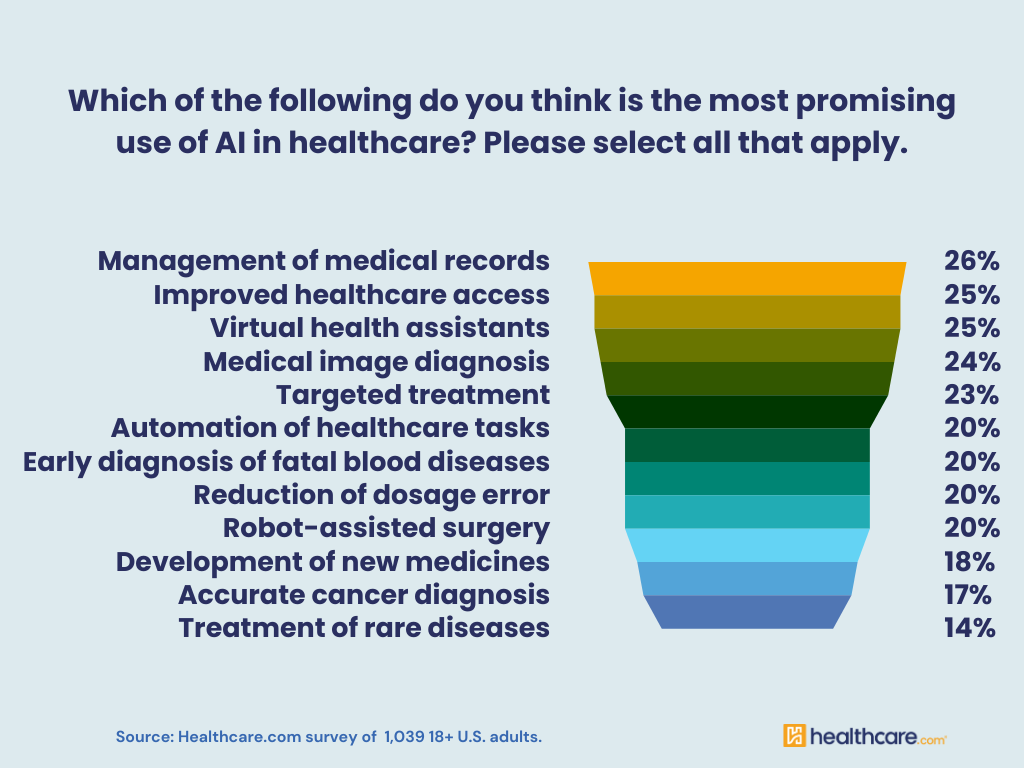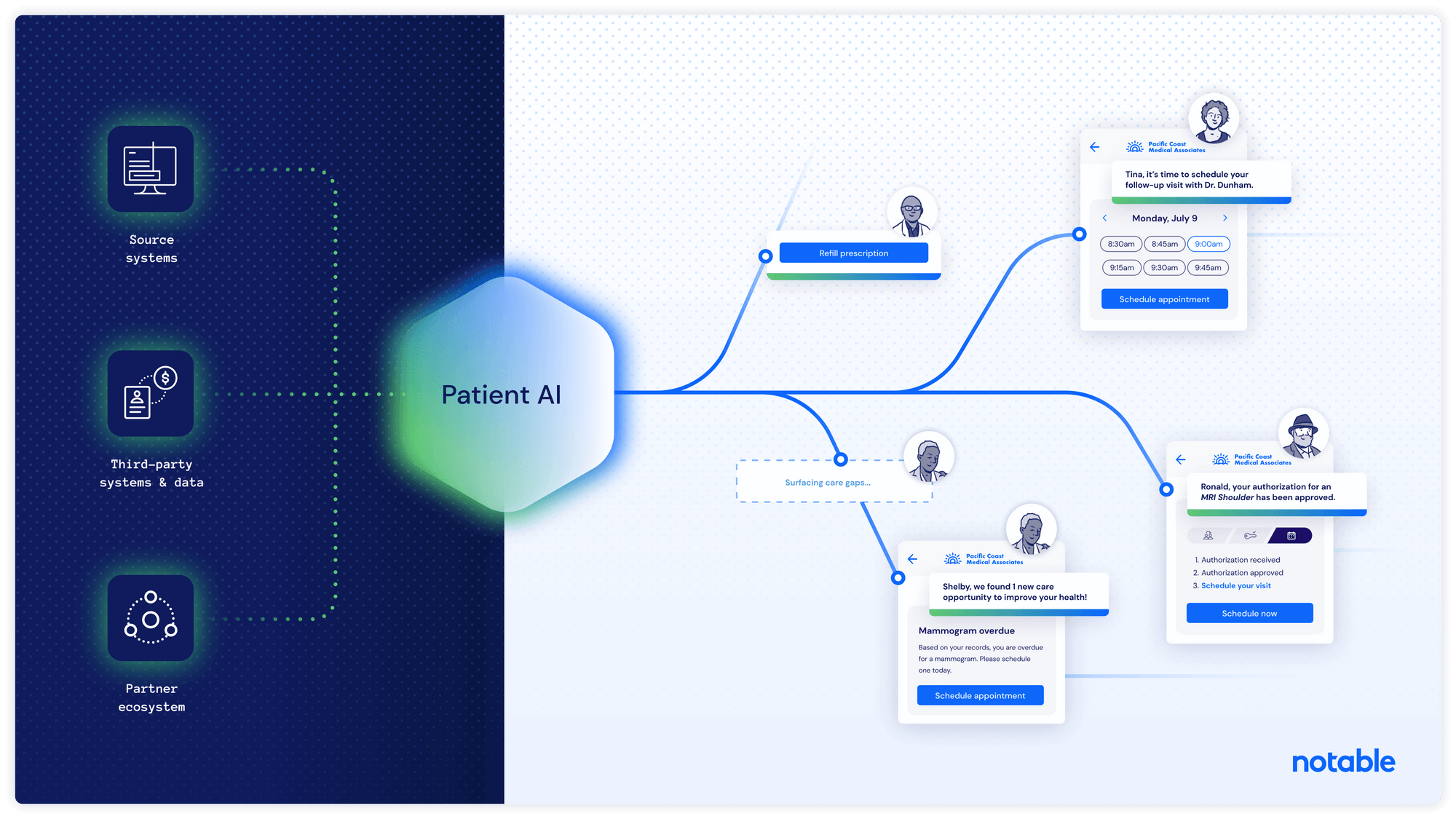What You Should Know: Healthcare.com polled over 1,000 U.S. adults in a healthcare tech survey and found: 20% of Americans say the privacy of their health data has been violated45% say AI in Healthcare is TrustworthyAmong 8 possible AI uses in healthcare, the top three reported by pollees are :Virtual health assistants (33%), targeted treatments (30%), and diagnosis of blood diseases (21%)Among 12 possible
Read More
assistants
Notable Leverages GPT to Automate Patient Front Office Experience
What You Should Know: Notable, an intelligent automation company for healthcare, launches Patient AI, a solution leveraging large language models (LLMs) and GPT (the technology powering ChatGPT) to bring personalization at scale to healthcare.Using GPT to scan existing clinical documentation, this tech can detect missed diagnoses, identify lapsed insurance cards, incorrect addresses, eligible clinical trials, or costly care gaps in real-time across an entire patient population. How
Read More
CareRev Expands Flexible Healthcare Staffing into Delaware
What You Should Know: CareRev, a technology platform reimagining healthcare staffing by connecting hospitals and health systems with local nurses and other healthcare professionals for daily shifts, announced its expansion into Delaware with a partnership with Beebe Healthcare.Beebe will utilize CareRev’s technology to identify and hire qualified local Delaware talent to support their full-time hospital staff and ultimately improve patient safety and outcomes. Staffing managers at Beebe
Read More
Orbita and Isabel Healthcare Integrate to Deliver ‘Find Care’ Search & Symptom Triage to Streamline Patient Access
What You Should Know: - Orbita, a provider of virtual assistants for healthcare, announced a partnership with Isabel Healthcare that will improve patients’ digital experiences, helping them find the right care for their individual health circumstances. Isabel’s Symptom Checker/Triage utilizes every-day language to help patients access appropriate care with the right urgency. - Many people who turn to technology when looking for a
Read More
ECRI Names Top 10 Patient Safety Concerns for 2023
What You Should Know: - The pediatric mental health crisis is named the number one patient safety concern, according to ECRI’s 2023 list of most pressing patient safety concerns. - The nation’s largest nonprofit patient safety organization notes that, while rates of depression and anxiety in children have increased since 2017, the COVID-19 pandemic has elevated the situation to crisis levels. Here are
Read More
Improving The Digital Experience – for Both Patient and Employee
It’s a tired, old saw: Healthcare organizations are woefully behind when it comes to technology, automation and digital experiences. Leaders are sick of hearing it. But that doesn’t make it any less true. Current market pressures, however, compel hospitals, health systems and medical practices to reconsider their hesitancy in embracing these innovations. A combination of consumer demand and acute, unrelenting labor shortages force leaders to explore the practicality of leveraging
Read More
The Market Demand for Data-Driven Tech Solutions in Healthcare
The market demand for data-driven technology solutions in healthcare is on the rise. Today, one-third of the world's data is generated by the healthcare industry. This data is often complex and is coming from multiple different sources such as personal health information, claims data, clinical trial data, patient surveys, disease registries, population health statistics, wellness apps, and wearable devices. And so, the need for data management technologies continues to grow. In the Future Health
Read More
Healthcare AI Transformation: 9 Executive Predictions to Watch in 2023
Piotr Orzechowski, Co-Founder and CEO of Infermedica Innovation areas to watch: One of the exciting areas of applied machine learning recently is so-called Generative Tech. Some say it’s the biggest change to the Internet since crypto was invented. Generative Tech is developing at an unprecedented pace and many of us already had a chance to enjoy images created by OpenAI’s DALLE-E or content generated by GPT-3 language model. However real-world applications of generative tech in health are
Read More
Orbita Launches Blaze to Convert Websites into Virtual Assistant
What You Should Know: - Orbita, a leading provider of intelligent virtual assistants and workflow automation for healthcare, launched a new solution set to transform the healthcare website experience. Orbita Blaze uses conversational AI and advanced search technology to interpret and address patients’ requests promptly and with precision, so they access the information and care they need. - Poor healthcare web navigation has historically been a barrier to care, as 78%
Read More
22 Executive Digital Health Predictions to Watch in 2023
Jon Bloom, MD, CEO and Co-founder of Podimetrics From a digital health perspective, 2022 was a reset year for many and a serious reality check. We went from sky high growth to the sky is falling, and in 2023 I think this market correction movement will continue forward. To me, the biggest surprise of 2022 was that despite the market tanking, digital health companies continued to truck forward with huge deals. This includes massive acquisitions like Amazon and OneMedical, as well as deals like
Read More










